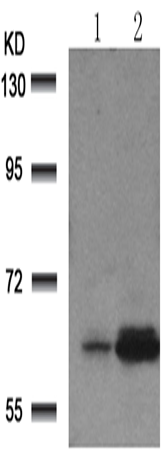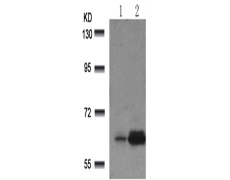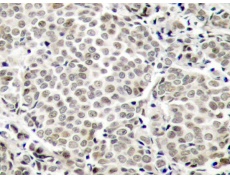中文名稱: 兔抗RELA (Phospho-Ser529)多克隆抗體
英文名稱: Anti-RELA (Phospho-Ser529) rabbit polyclonal antibody
別 名: p65; NFKB3
相關(guān)類別: 一抗
儲 存: 冷凍(-20℃) 避光
宿 主: Rabbit
抗 原: RELA (Phospho-Ser529)
反應(yīng)種屬: Human
標(biāo) 記 物: Unconjugate
克隆類型: rabbit polyclonal
Background:
NF-kappa-B is a pleiotropic transcription factor which is present in almost all cell types and is involved in many biological processed such as inflammation, immunity, differentiation, cell growth, tumorigenesis and apoptosis. NF-kappa-B is a homo- or heterodimeric complex formed by the Rel-like domain-containing proteins RELA/p65, RELB, NFKB1/p105, NFKB1/p50, REL and NFKB2/p52 and the heterodimeric p65-p50 complex appears to be most abundant one. The dimers bind at kappa-B sites in the DNA of their target genes and the individual dimers have distinct preferences for different kappa-B sites that they can bind with distinguishable affinity and specificity. NF-kappa-B complexes are held in the cytoplasm in an inactive state complexed with members of the NF-kappa-B inhibitor (I-kappa-B) family. In a conventional activation pathway, I-kappa-B is phosphorylated by I-kappa-B kinases (IKKs) in response to different activators, subsequently degraded thus liberating the active NF-kappa-B heterodimeric p65-p50 and p65-c-Rel complexes are transcriptional activators. The inhibitory effect of I-kappa-B upon NF-kappa-B the cytoplasm is exerted primarily through the interaction with p65. p65 shows a weak DNA-binding site which could contribute directly to DNA binding in the NF-kappa-B complex.
Applications:
WB, IHC, IF
Name of antibody:
RELA (Phospho-Ser529)
Immunogen:
Synthetic peptide of human RELA (Phospho-Ser529)
Full name:
v-rel reticuloendotheliosis viral oncogene homolog A (avian) (Phospho-Ser529)
Synonyms:
p65; NFKB3
SwissProt:
Q04206
IHC positive control:
Human breast carcinoma
IHC Recommend dilution:
50-100
WB Predicted band size:
65 kDa
WB Positive control:
293 cells untreated or treated with TNF-α
WB Recommended dilution:
500-1000
Positive control:
Hela cells
Recommended dilution:
100-200
技術(shù)規(guī)格



 購物車
購物車 幫助
幫助
 021-54845833/15800441009
021-54845833/15800441009


